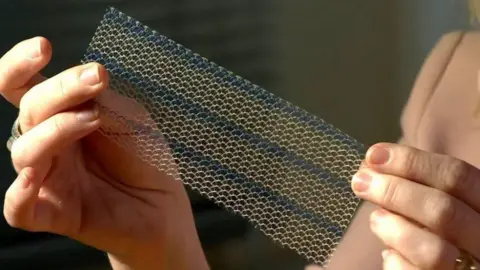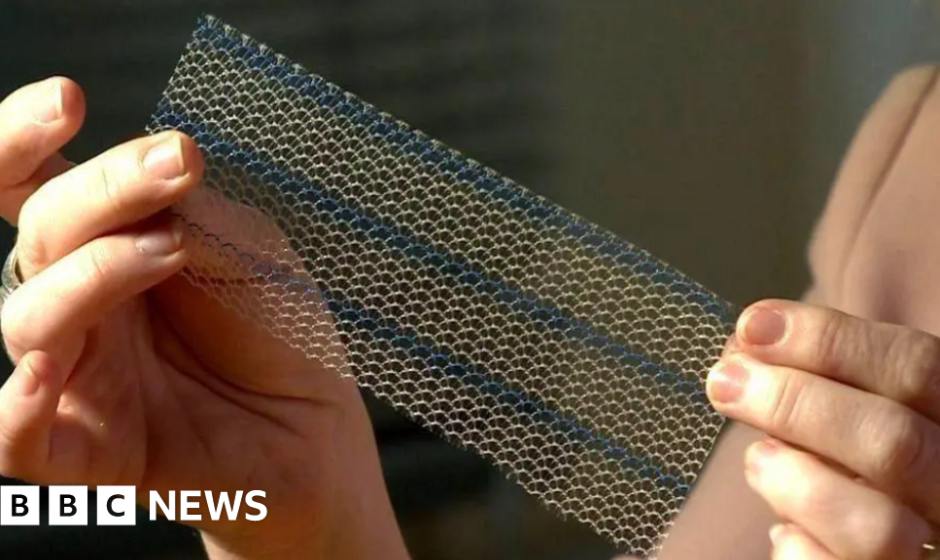BBC News, Cambridgeshire
 BBC
BBCA woman has criticised the government for “dragging its feet” when it came to making reforms for women harmed by pelvic mesh implants.
Five years ago, the Cumberlege First Do No Harm report found two drugs and the medical device had caused women or their babies harm.
The report made recommendations to support victims, but most key proposals have been ignored, said Kath Sansom, a Sling The Mesh campaign founder from March, Cambridgeshire.
A spokesperson for the Department of Health and Social Care (DHSC) said: “This is a complex area of work and the government is carefully considering the patient safety commissioner’s recommendations in full.”
Baroness Cumberlege and her team spoke to more than 700 women and their families who experienced complications linked to pelvic mesh implants and the drugs Primodos and sodium valproate.
Pelvic mesh was used to give weak or damaged tissue extra support, but the net-like implant could erode and harden, cutting through tissue and leaving women in permanent pain, unable to walk, work or have sex.
Primodos, a hormonal pregnancy test, is thought to be associated with birth defects and miscarriages and the epilepsy drug sodium valproate was found to cause major birth defects – but pregnant women were not properly warned about the risks.
The report said thousands of lives were ruined because officials failed to listen to female patients.
Accidental advocate
 Kath Sansom
Kath SansomSince 2020, three of the report’s nine key recommendations were fully implemented, said Ms Sansom.
This included a government apology, mesh complication centres and appointing a patient safety commissioner for England.
A fourth recommendation, a database to track patients who have had a medical device was still ongoing.
Ms Sansom became an “accidental advocate” when a pelvic mesh procedure to fix her bladder leaks caused by childbirth left her in “terrible pain”.
She said: “The institutional inertia amplifies the suffering – especially the lack of compensation for the harm caused to thousands of women who innocently trusted their doctor that they were being given a safe treatment.
“Five years ago, Baroness Cumberlege laid bare the systemic failures that caused irreparable harm yet here we are in 2025, and the government has dragged its feet on the most critical reforms.
“Women are still being failed by a healthcare system that was supposed to protect them.”
Considering proposals
Ms Sansom criticised the government’s decision to move the patient safety commissioner role from the DHSC to the Medicines and Healthcare products Regulatory Agency, as she believed it “silences the patient voice instead of strengthening it”.
Sharon Hodgson, the Labour chair of the all-party parliamentary group First Do No Harm – Mesh, Primodos, Valproate, said it was “hugely disappointing” to have so little progress.
“Five years ago today, things felt hopeful,” she said.
“The review marked what we thought would be the beginning of real systematic change, the start of building a system that listens to women when they report harm – an end to defensiveness and denial.”
She added thousands of women and families who were “irreversibly harmed through no fault of their own” were yet to see compensation.
A spokesperson for the Department of Health and Social Care said: “The harm caused by pelvic mesh continues to be felt today.
“Our sympathies are with those affected and we are fully focused on how best to support patients and prevent future harm.
“The Department of Health and Social Care is considering the recommendations in the report and will provide a further update.
“Health Minister Baroness Gillian Merron met patients affected and has committed to providing a further update.”
#Womens #health #campaigners #results #pelvic #mesh #victims



